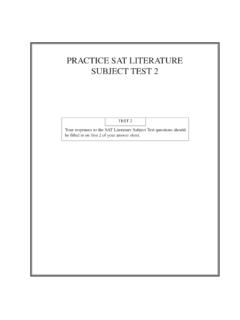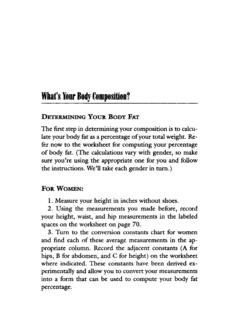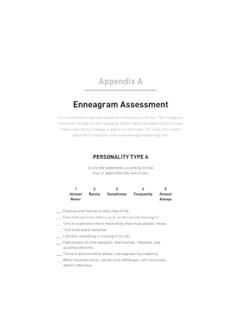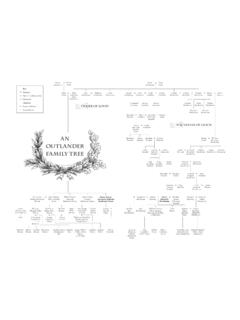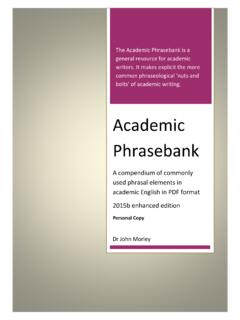Transcription of AP English Language and Composition Exam
1 AP English Language and Composition ExamSECTION I: Multiple-Choice QuestionsDO NOT OPEN THIS BOOKLET UNTIL YOU ARE TOLD TO DO I of this examination contains 54 multiple-choice questions. Fill in only the ovals for numbers 1 through 54 on your answer all of your answers to the multiple-choice questions on the answer sheet. No credit will be given for anything written in this exam booklet, but you may use the booklet for notes or scratch work. After you have decided which of the suggested answers is best, completely fill in the corresponding oval on the answer sheet. Give only one answer to each question.
2 If you change an answer, be sure that the previous mark is erased completely. Here is a sample question and Question Sample Answer Chicago is a ABCDE(A) state (B) city (C) country (D) continent (E) villageUse your time effectively, working as quickly as you can without losing accuracy. Do not spend too much time on any one question. Go on to other questions and come back to the ones you have not answered if you have time. It is not expected that everyone will know the answers to all the multiple-choice GuessingMany candidates wonder whether or not to guess the answers to questions about which they are not certain.
3 Multiple choice scores are based on the number of questions answered correctly. Points are not deducted for incorrect answers, and no points are awarded for unanswered questions. Because points are not deducted for incorrect answers, you are encouraged to answer all multiple-choice questions. On any questions you do not know the answer to, you should eliminate as many choices as you can, and then select the best answer among the remaining ExamAt a GlanceTotal Time1 hourNumber of Questions54 Percent of Total Grade45%Writing InstrumentPencil requiredSection IGO ON TO THE NEXT PAGE. 154 | Cracking the AP English Language & Composition ExamENGLISH Language AND COMPOSITIONSECTION ITime 1 hourDirections: This part consists of selections from prose works and questions on their content, form, and style.
4 After reading each passage, choose the best answer to each question and completely fill in the corresponding oval on the answer : Pay particular attention to the requirement of questions that contain the words NOT, LEAST, or 1-10. Read the following passage carefully before you choose your answers.(The following passage is from Jonathan Swift s 1729 essay A Modest Proposal. )There only remains one hundred and twenty thousand children of poor parents annually born. The question therefore is, how this number shall be reared and provided for, which, as I have already said, under the present situation of affairs, is utterly impossible by all the methods hitherto proposed.
5 For we can neither employ them in handicraft or agriculture; we neither build houses (I mean in the country) nor cultivate land: they can very seldom pick up a livelihood by stealing, till they arrive at six years old, except where they are of towardly parts, although I confess they learn the rudiments much earlier, during which time, they can however be properly looked upon only as probationers, as I have been informed by a principal gentleman in the county of Cavan, who protested to me that he never knew above one or two instances under the age of six, even in a part of the kingdom so renowned for the quickest proficiency in that art.
6 I am assured by our merchants, that a boy or a girl before twelve years old is no salable commodity; and even when they come to this age they will not yield above three pounds, or three pounds and half-a-crown at most on the exchange; which cannot turn to account either to the parents or kingdom, the charge of nutriment and rags having been at least four times that value. I shall now therefore humbly propose my own thoughts, which I hope will not be liable to the least objection. I have been assured by a very knowing American of my acquaintance in London, that a young healthy child well nursed is at a year old a most delicious, nourishing, and wholesome food, whether stewed, roasted, baked, or boiled; and I make no doubt that it will equally serve in a fricassee or a ragout.
7 I do therefore humbly offer it to public consideration that of the hundred and twenty thousand children already computed, twenty thousand may be reserved for breed, whereof only one-fourth part to be males; which is more than we allow to sheep, black cattle or swine; and my reason is, that these children are seldom the fruits of marriage, a circumstance not much regarded by our savages, therefore one male will be sufficient to serve four females. That the remaining hundred thousand may, at a year old, be offered in the sale to the persons of quality and fortune through the kingdom; always advising the mother to let them suck plentifully in the last month, so as to render them plump and fat for a good table.
8 A child will make two dishes at an entertainment for friends; and when the family dines alone, the fore or hind quarter will make a reasonable dish, and seasoned with a little pepper or salt will be very good boiled on the fourth day, especially in winter. I have reckoned upon a medium that a child just born will weigh 12 pounds, and in a solar year, if tolerably nursed, increaseth to 28 pounds. I grant this food will be somewhat dear, and therefore very proper for landlords, who, as they have already devoured most of the parents, seem to have the best title to the children. 1. This text can best be described as (A) scientific(B) satirical(C) forthright(D) humanitarian(E) sadistic2.
9 In the first, second, and fourth paragraphs the author relies on dubious(A) similes(B) ad hominem arguments(C) extended metaphors(D) arguments from authority(E) appeals to ignoranceLine510152025303540455055 Section IGO ON TO THE NEXT PAGE. 156 | Cracking the AP English Language & Composition Exam3. It can be inferred that the merchants (line 17) and the American (line 26) represent(A) cannibals who routinely eat children(B) the author s fictional acquaintances(C) aristocrats who exploit the poor(D) businessmen well-versed in commerce(E) typical Londoners4. The phrase the charge of nutriment and rags having been at least four times that value (lines 22-23) is ironic chiefly because(A) food was relatively cheap at that time(B) four times is a mere approximation(C) twelve pounds is a very small sum of money(D) the parents could not support their children without the aid of the kingdom(E) there is no evidence that the children were wearing rags5.
10 The word fricassee (line 30) is best interpreted to mean(A) animal(B) child(C) dish(D) place(E) master6. Which of the following rhetorical devices does the author employ in lines 32-39?(A) process analysis (B) example (C) cause and effect(D) deductive reasoning(E) analogy7. The phrase always advising the mother to let them suck plentifully in the last month (lines 42-43) extends the comparison between the children and(A) properly nourished mammals(B) poor and ruthless parents(C) savages(D) animals raised for slaughter(E) the poor treatment of animals8. In line 52, dear means(A) expensive(B) sweet(C) cherished(D) unforgettable(E) unhealthy9.
